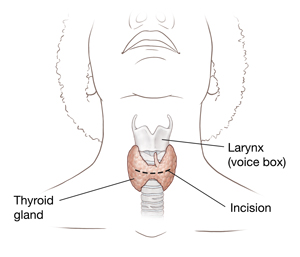Having Thyroid Surgery
You are having surgery to remove part or all of your thyroid. The thyroid is a gland in the front of the neck. It sits just below the voice box (larynx). The gland’s main job is to make thyroid hormone. This helps control the body’s metabolism. Thyroid surgery may be done to treat an enlarged thyroid (goiter). Or it may be done to remove a lump (nodule). It may also be done to treat an overactive gland (hyperthyroid). Or it may be done to treat a gland that may have cancer cells.
Getting ready for surgery
-
Tell your healthcare provider about all the medicines you take. This includes prescription and over-the-counter medicines. It includes aspirin and other blood thinners. It also includes vitamins, herbs, and other supplements. You may need to stop taking some medicines.
-
Follow all directions you're given for not eating or drinking before the surgery.
-
Write down questions you have about the surgery. This helps to make sure the provider addresses all your concerns before you agree to the procedure. Ask the surgeon how much experience they've had doing thyroid surgeries.
During the surgery
-
An IV (intravenous) line will be put in your arm or hand. You’ll receive fluids and medicines through the IV during the surgery.
-
You’ll be given general anesthesia to keep you asleep and pain-free during the surgery.
-
A cut (incision) is made in your neck, along a crease in your skin.
-
Half of the thyroid gland may be taken out (lobectomy). Or most of the gland may be taken out (subtotal thyroidectomy). In some cases, all of the gland is taken out (total thyroidectomy). The surgeon may not know how much to take out until the surgery.
-
The incision is then closed with surgical strips, clips, or stitches (sutures). A thin tube (drain) may be left in the incision. This helps remove fluid that can build up.
 |
| The incision is made at the base of your neck. |
After the surgery
-
It may take a few hours for the anesthesia to wear off. You'll get up and walk around soon after the surgery. You'll be watched for bleeding.
-
You may spend some time staying in the hospital or surgery center after the surgery.
-
In most cases, you can eat and drink the evening after the surgery. You may still have an upset stomach (nausea) from the anesthesia.
-
You’ll be given medicine to help manage pain, if needed.
-
You will be tested to make sure your parathyroid glands are working. The stress of surgery may stop them from working for a short time. If this happens, you may be given calcium and vitamin D pills for a few days.
-
You may have a sore throat and a hoarse voice for 1 week or so after the surgery.
-
You may need to take a thyroid pill for the rest of your life if your thyroid gland can no longer make thyroid hormone.
Risks and possible complications
The risks and possible complications of this procedure include:
-
Bleeding
-
Infection
-
Damage to nerves in your voice box. This can lead to a hoarse voice. Often this hoarseness gets better over time. But in rare cases it may last.
-
Damage to the parathyroid glands or their blood supply. This can make them underactive (hypoparathyroidism). These glands control the amount of calcium in your blood. Often the hypoparathyroidism gets better over time. But you may need to take daily calcium pills for a long time, or for the rest of your life. You may also need to take vitamin D supplements.
Online Medical Reviewer:
Chris Southard RN
Online Medical Reviewer:
Marianne Fraser MSN RN
Online Medical Reviewer:
Melinda Murray Ratini DO
Date Last Reviewed:
3/1/2024
© 2000-2025 The StayWell Company, LLC. All rights reserved. This information is not intended as a substitute for professional medical care. Always follow your healthcare professional's instructions.